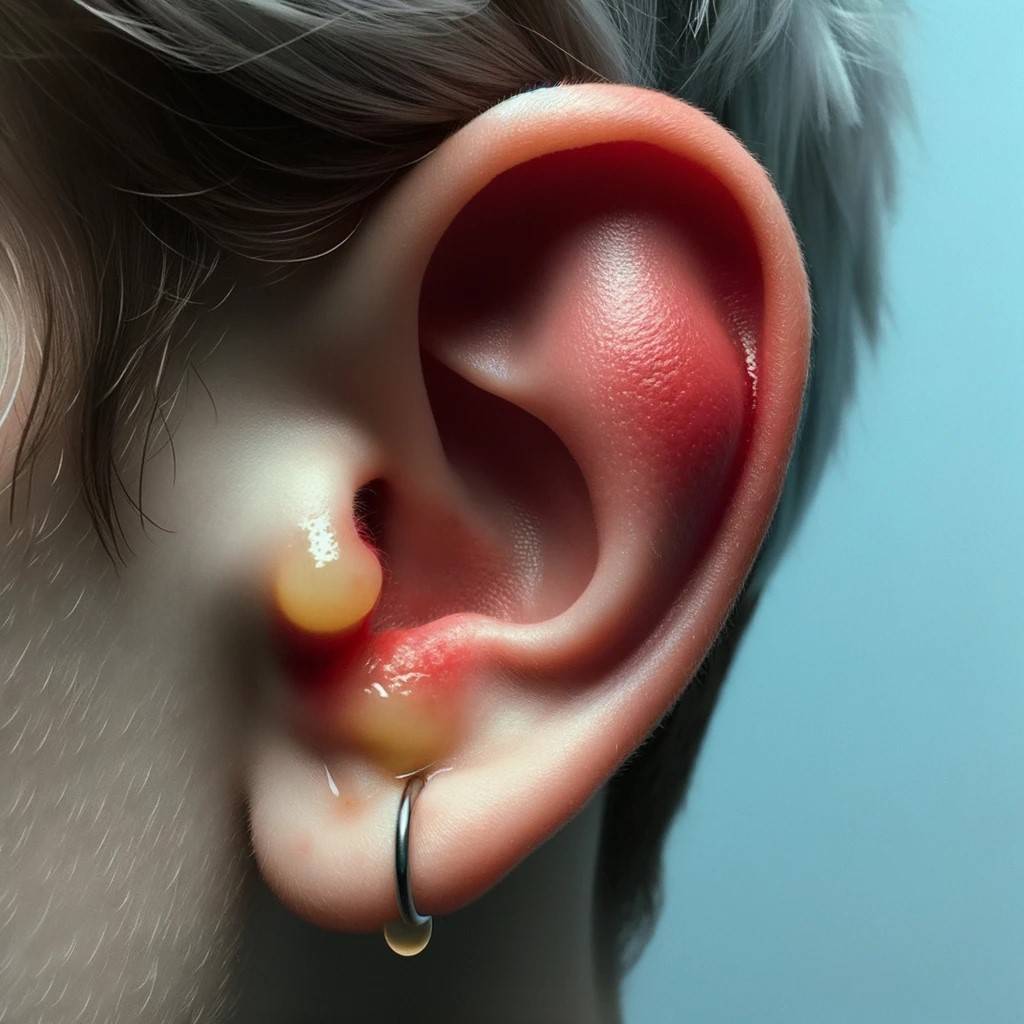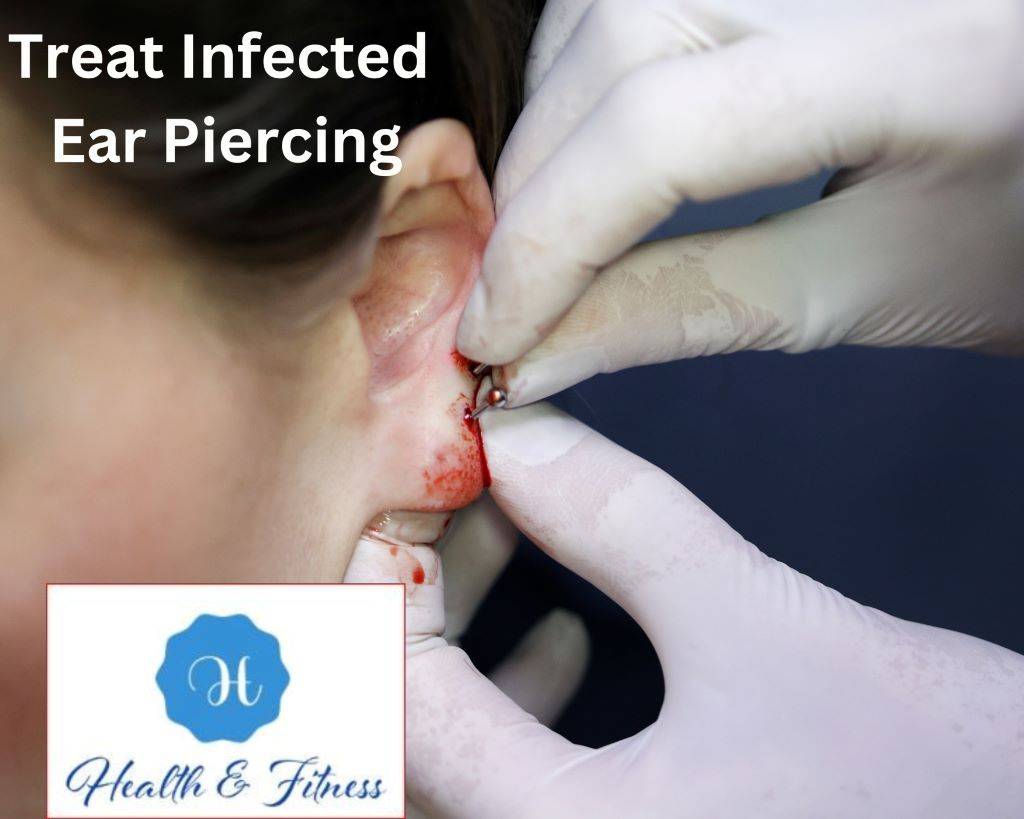Treat Infected Ear Piercing: Expert Tips for a Speedy Resolution
Treat Infected Ear Piercing: Learn expert tips to treat infected ear piercings for a speedy resolution. Safeguard your ear health and enjoy your piercings.
Introduction to Treat Infected Ear Piercing
Ear piercings are an age-old trend, and people get them for various reasons; style, culture, or self-expression. However, sometimes a painful situation arises when an infection sets in. But don’t worry; we’ve got your back! In this blog post, we’ll help you treat infected ear piercings swiftly and effectively. So let’s dive right in!
Identifying an Infected Ear Piercing

First, let’s figure out if you’re dealing with an infection. Here are some common symptoms that could indicate an infected ear piercing:
- Redness and swelling: A little redness is expected after getting a new piercing, but prolonged redness and swelling could indicate infection.
- Pain: It’s normal for a new piercing to be slightly painful, but if it persists or intensifies, it could signal an infection.
- Discharge: A clear or whitish discharge is normal during healing. However, it’s time to take action if the discharge becomes yellow, green, or foul-smelling.
- Fever: Fever indicates infection battling. If you develop a fever and other symptoms, it’s time to treat your infected ear piercing.
Causes of Infection
Understanding the causes of infection can help you prevent future issues. Some common reasons for an infected ear piercing include the following:
Poor aftercare: Not cleaning your piercing properly can introduce bacteria.
Touching with dirty hands: Wash your hands before touching your piercing.
Allergic reactions: Some people are allergic to certain metals, causing irritation and infection.
Contaminated jewelry: Make sure to use high-quality, sterilized jewelry.
Trauma: Bumping or pulling on your piercing can cause damage and increase the risk of
infection.
What are some signs that an ear piercing is infected?
You must watch for signs of infection when you get your ears pierced. While some redness and discomfort are normal during healing, specific symptoms may indicate an infection. Here are some common signs to watch for:
Persistent Redness: If the area around the piercing stays red and doesn’t improve over time, it could be infected.
Excessive Swelling: Normal swelling should go down, but it might be an infection if it worsens or spreads.
Intense Pain or Discomfort: While some pain is expected, severe or increasing pain could signal an infection.
Abnormal Discharge: Clear or slightly yellow fluid is normal, but pus, thick yellow/green discharge, or a foul odor indicate an infection.
Elevated Body Temperature: If you develop a fever and other symptoms, it may be a sign of infection.
Development of Abscess or Bumps: Tender bumps or abscesses around the piercing site could indicate infection.
Extended Healing Time: If your piercing doesn’t show signs of improvement after a while, it’s worth considering infection as a possibility.
Remember, if you experience any combination of these signs or have concerns about your piercing, it’s best to consult a healthcare provider or a licensed piercer for proper diagnosis and treatment. Taking care of your piercing and practicing proper hygiene can help prevent infections and promote healing.
Expert Tips to Treat Infected Ear Piercing
Now that we’ve identified the infection and its causes let’s dive into expert tips to treat an infected ear piercing:
Clean Up
To help the wound heal, it is essential to clean the area. Do these things:
Wash your hands thoroughly with soap and water.
Use a saline solution or a non-alcoholic antiseptic solution to clean the area. Avoid alcohol or hydrogen peroxide, which can be too harsh and delay healing.
Gently remove any crust or discharge around the piercing with a cotton swab soaked in the cleaning solution.
Rinse the area with water and pat dry with a clean towel.
Apply a Warm Compress
A warm compress can help reduce swelling and speed up mending. Here’s how:
Warm some water, then soak a clean towel.
Place the warm cloth on the infected area for 5-10 minutes, 2-3 times a day.
Ensure not to apply too much pressure, which can cause further irritation.
Take Over-the-Counter Pain Relievers
Consider taking over-the-counter pain relievers like ibuprofen or acetaminophen to alleviate pain and reduce inflammation. Be sure to follow the recommended dosage instructions on the package.
Don’t Remove the Jewelry
Resist the urge to remove your jewelry, as this can cause the hole to close up and trap the infection inside. If you’re worried about an allergic reaction, consult a professional piercer or a doctor to replace the jewelry with a more suitable material.
Preventing Future Infections
To avoid dealing with another infected ear piercing, follow these preventative measures:
Choose a reputable piercer: Make sure your piercer is experienced, licensed, and follows proper sterilization procedures.
Choose hypoallergenic jewelry: Choose high-quality materials like surgical steel, titanium, or 14k gold to reduce the risk of allergic reactions.
Practice aftercare: Regularly clean your piercing with saline or gentle antiseptic solution. Avoid touching the area with dirty hands.
Avoid unnecessary trauma: Avoid brushing your hair, changing clothes, or sleeping to prevent bumping or pulling on your piercing.
Home Treatment for an Old Ear Piercing Infection
If you’re dealing with an infected ear piercing, there are simple home remedies to help alleviate the infection and promote healing. Remember that these remedies are best for minor infections, and if your symptoms worsen or persist, it’s best to seek professional medical advice. Here are some easy and effective old-fashioned home remedies:
1. Saltwater Soaks
Create a solution for warm water and salt. Dissolve 1/4 teaspoon of sea salt not iodized in 1 cup of pure warm water. Soak a clean cotton ball in the solution and gently apply it to the infected piercing. Leave it on for a few minutes, then rinse with plain water and pat dry. Repeat a few times a day to reduce inflammation and fight infection.
2. Warm Compress
Apply a warm compress to the infected piercing to increase blood circulation and promote healing. Soak a clean washcloth in warm water, wring out the excess, and cushion it against the infected area for 5-10 minutes. Repeat several times a day to soothe the infection.
3. Tea Tree Oil
Mix a few drops of tea tree oil with a carrier oil like coconut or olive oil. Apply the mixture to the infected area using a cotton swab or clean fingertip. Leave it on for 10-15 minutes, then rinse with warm water and pat dry. Repeat twice daily until the infection improves.
4. Chamomile Compress
Brew a cup of chamomile tea, let it cool, and soak a clean washcloth in the tea. Place the chamomile-soaked cloth on the infected piercing for 5-10 minutes. Repeat several times a day to relieve discomfort and promote healing.
5. Antibacterial Essential Oils
Use a cotton swab to apply a handful of lavender oil or hydrosol to the infected area. Allow it to air dry. Repeat a few times a day to fight the infection.
6. Proper Hygiene
Clean the infected area gently with mild, fragrance-free soap and water. Avoid harsh chemicals or alcohol-based solutions. After cleaning, pat the area dry with a clean towel or let it air dry.
Remember, these home remedies are most effective for minor infections. If your symptoms worsen or you have concerns, consult a healthcare professional or a licensed piercer for proper evaluation and treatment. Maintain aftercare practices, including cleaning your piercing regularly with a saline solution recommended by your piercer and avoiding touching or twisting the jewelry with dirty hands. With proper care, your ear piercing can heal and regain its beauty.
When to See a Doctor
Sometimes, it’s essential to consult a doctor when dealing with an infected ear piercing. Reach out to a medical professional if:
- Your infection doesn’t improve within a few days of following the expert tips.
- You are experiencing severe pain, fever, or chills.
- The infection spreads beyond the pierced area, causing red streaks or increased swelling.
- You suspect an allergic reaction to the jewelry and need professional advice on suitable alternatives.
Conclusion, for Treat Infected Ear Piercing
An infected ear piercing can be a painful and frustrating experience. However, with the expert tips in this post, you should now be well-equipped to treat infected ear piercings and promote a speedy resolution. Proper aftercare prevents infections and ensures a healthy, stylish piercing. And, as always, if in doubt, consult a professional piercer or a doctor for advice.



